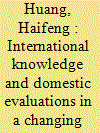| Srl | Item |
| 1 |
ID:
084938


|
|
|
|
|
| Publication |
2008.
|
| Summary/Abstract |
The question about the relationship between al-Qaeda and terrorist organizations operating at the national, regional and international levels has been at the centre of the debate concerning appropriate policy responses to both. Debates focus on the question whether to treat terrorism mostly as a home-gown, grassroots phenomenon, or something significantly inflamed by foreign encouragement and sponsorship. Evidence from Morocco suggests that the national and regional terrorist organizations exhibit varying degrees of affiliation with al-Qaeda, ranging from acting as local franchises to complete independence.
The Moroccan state's response to this flexible situation is evaluated in the three case studies, each reflecting the case of terrorist organization or cell that has been dismantled. They show that Moroccan anti-terrorism policy has been generally successful, despite some erosion in human rights. The framework used in the study examines the sequence of events that led to the dismantling of the organization studied, the demographics of its membership, its ideology, and its targets. The holistic response, which combines heightened levels of law enforcement, socio-economic reform, and religious restructuring, is helping Morocco with its war against both domestic and international terrorism and may offer hints for counterterrorism elsewhere.
|
|
|
|
|
|
|
|
|
|
|
|
|
|
|
|
| 2 |
ID:
140816


|
|
|
|
|
| Summary/Abstract |
Do knowledge and information about foreign countries affect people’s evaluation of domestic situations? Using unique survey and experimental data, this research finds that Chinese citizens with more positive perceptions and especially overestimation of foreign socioeconomic conditions have more negative evaluations of China and the Chinese government. Moreover, correcting socioeconomic misinformation about foreign countries improves one’s evaluations of China, indicating that the causal direction is at least partly from rosier estimation of foreign conditions to lower domestic evaluations. The relationship between domestic evaluations and international political knowledge, as measured by familiarity with political affairs and figures in foreign countries, is typically not significant, although awareness of political instability in other countries can increase satisfaction with one’s own country. These results contribute both substantively and conceptually to the study of politically relevant knowledge and information, and shed new light on the nuances of information flow and opinion formation in changing societies.
|
|
|
|
|
|
|
|
|
|
|
|
|
|
|
|